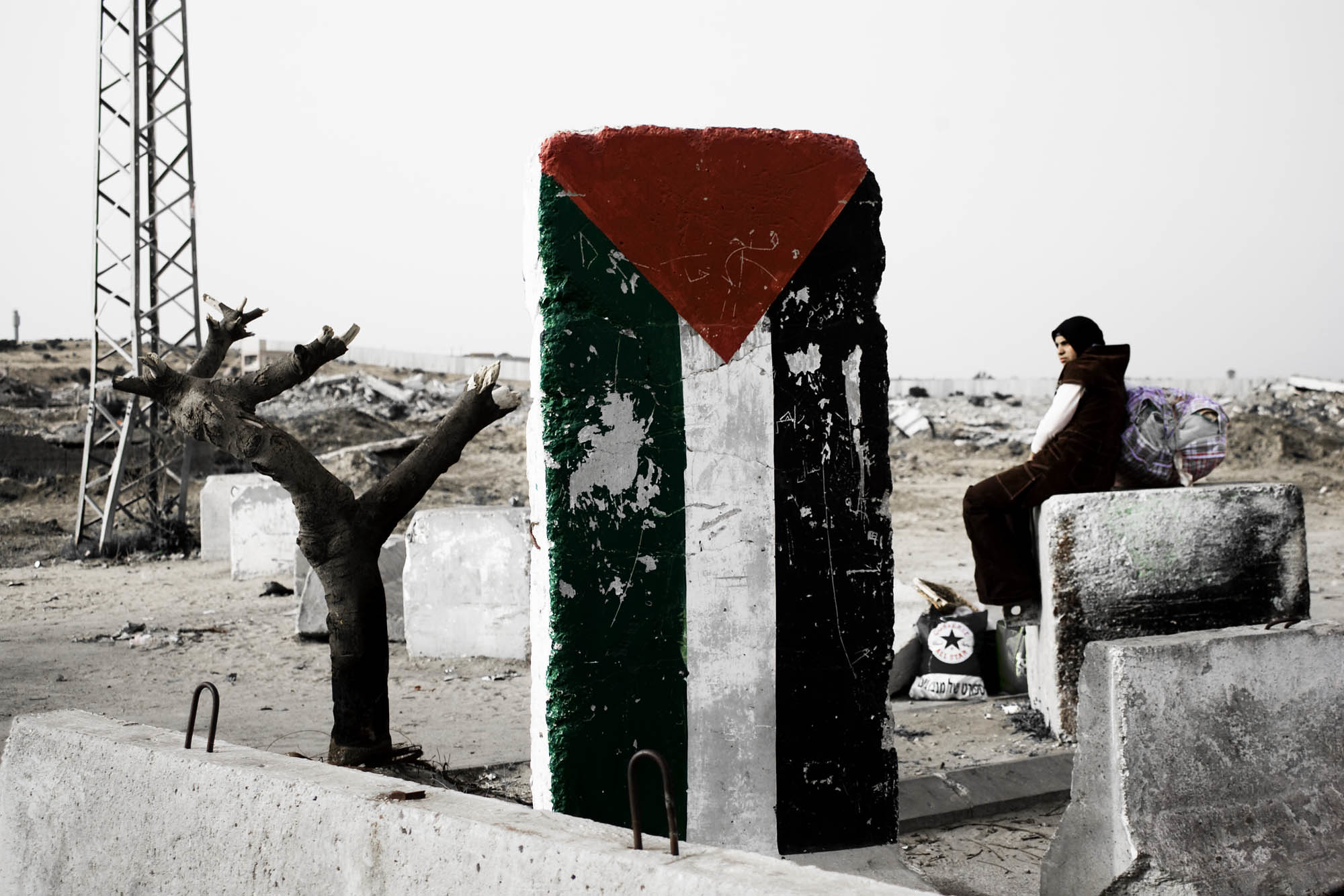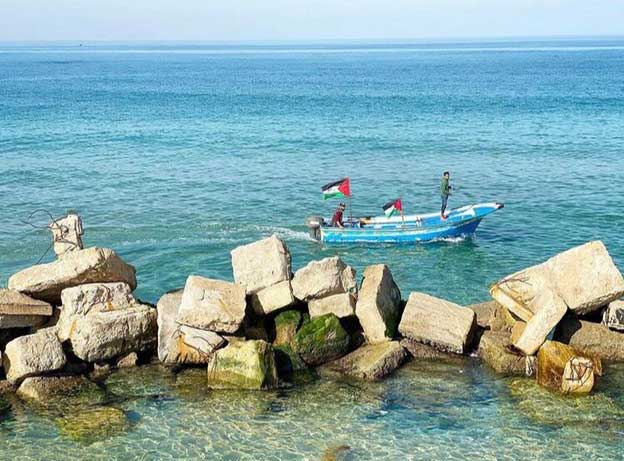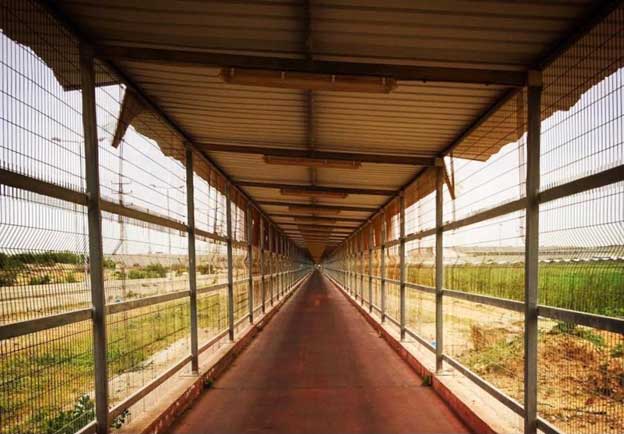As people in many countries begin to see the light at the end of the tunnel, we are once again left behind, writes Laila Barhoum.

The no man’s land in what Israel calls the buffer zone along the Gaza-Israel border, 2008. (Kashfi Halford, Flickr, CC BY-NC 2.0)
By Laila Barhoum
in Gaza
Inter Press Service
We were able to keep the coronavirus at bay for five months in Gaza, the densely populated Palestinian strip of land surrounded by Israel that I call home. But the Coronavirus doesn’t respect walls or artificial borders. While preparations were made for the pandemic to inevitably breach a blockade so few Palestinians can, we waited for it to come for us. And it did.
In one of the most sealed off places in the world, we knew the virus now insidiously spreading in our community could be catastrophic. In the early days the realities of over two million Palestinians, trapped between a wall and sea in Gaza, became suddenly shared with millions more around the world who were unable to leave their houses and going short on basic supplies. “Dear World, how is the lockdown? – Gaza” was trending on Twitter.
Dear world , how is the lockdown ? #Gaza is asking,,,,, #freePalestine #freedom #palestine #HumanRights #jerusalen #minimumstandardofliving #italy #Corona What we are seeing today , people in Gaza are seeing everyday since a very long time pic.twitter.com/Z41cjibKaM
— Anas Kayed (@KurdiAnas) March 16, 2020
Now, like in the rest of the world, the virus is ripping through our already suffering community with a new surge calling for renewed lockdown measures – and with Ramadan beginning. But you can’t wear a mask when you don’t have one.
You can’t social distance when you live in a crowded refugee camp, or share a small house with a big family. You can’t wash your hands for 20 seconds when you don’t have enough running water. In Gaza, it’s hard to take measures to protect ourselves from a pandemic when we are already struggling to survive.

Young Palestinians drive their boat along the coast near the Gaza Sea port, selling boat rides as a way to earn a living. (Laila Barhoum/ Oxfam)
And as many countries begin to see the light at the end of the tunnel as the long-awaited vaccination programme gathers pace across the world, Gaza is once again left behind.
While Israel was celebrated globally for the leading pace of its vaccination rollout, the first shipment of 2,000 doses of the vaccine, intended for medical staff working in intensive care rooms and emergency departments, was initially blocked by Israeli authorities from entering Gaza.
Meaning of ‘Separation Policy’
For every subsequent batch of vaccines destined for our small coastal enclave, it will be Israel alone who determines whether it can enter. This is what its “separation policy” means, keeping us isolated from the rest of the world and unable to break free from many chains, including the virus.
But it gets worse. As over half of the Israeli population are fully vaccinated against the Coronavirus, Israel used surplus vaccines as diplomatic bargaining chips, making deals with Czech Republic, Honduras, and Guatemala in exchange for UN votes and embassies.
Despite Israel’s vaccination campaign being extended to Palestinians with permits to work in Israel and its settlements, this does not come close to ensuring recovery in the Occupied Palestinian Territory or even covering our priority needs.

The long passage at the Erez crossing that Palestinians use to pass in and out of Gaza, when permitted. (Laila Barhoum/Oxfam)
Once again, Israel is refusing to effectively protect all Palestinians under its control and ensure their access to the most basic of healthcare, including an urgent vaccination campaign, that is their legal and moral obligation to provide.
This tells me and all other Palestinians across the occupied territory what we have been told so often before: that my life is viewed as inconsequential compared to Israel’s political position.
Our rights are traded away all too often to accommodate Israel, and so it is again with Covid-19. While countries around the world begin to vaccinate their citizens, Palestinians must fight to qualify as human beings who warrant even the most basic human rights. We see no indication that the world considers us deserving of a vaccine that can save our lives.
The Palestinian Authority recently received its first shipment of doses through COVAX, which are intended for healthcare workers and elderly people in the West Bank and Gaza. In the absence of a transparent Palestinian Authority Covid-19 strategy, some doses of vaccines destined for frontline workers have ended up in the hands of so called VIPs — government officials, presidential guards and the Palestinian national football team.
There have been over 65,000 cases of Covid-19 in Gaza. Two months ago, as we waited and hoped for a vaccine, I became part of the statistics. After I tested positive, I was scared and I lost my sense of time and place, and kept thinking, what if it gets worse?
For almost a year I had been sounding the alarm about the poor conditions of the health system in Gaza. It was terrifying that I might need to go to the hospital for care. As my breath became shorter by the hour, I asked my lungs not to fail me. We are already failed by so many things here.
But I continue to fight and recover from the disease. And I can’t help but think about how much we need this vaccine and how it is only fair to have free and just access to it.
A safe, effective, and universal Covid-19 vaccine is a public health necessity, an economic priority, and a moral imperative for all people everywhere. Including my grandmother. including my fellow Palestinians. Including me.
Vaccines should never be bargaining chips. No one should be prevented from accessing life-saving vaccines because of where they were born, where they live, or how much money they have.
Here in Gaza, we are still trapped. Even if we get through this pandemic, I am not sure what will follow. The decisions that most shape our lives are made not by us, but by policymakers in Jerusalem, and to a lesser extent in Ramallah, Washington, and Brussels. They usually serve to increase our misery, not benefit us. No amount of strength, smarts, or ambition can overcome the powerlessness of living without rights.
A year into your pandemic lockdown, you may begin to understand what ours has been like. But your lockdown will end in the months to come. Ours has been in place for 13 years with no end in sight.
Laila Barhoum is a Palestinian living in Gaza and a policy officer for Oxfam.
This article is from IPS.
The views expressed are solely those of the author and may or may not reflect those of Consortium News.
Please Support Our
Spring Fund Drive!



Show Comments